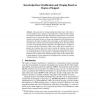Free Online Productivity Tools
i2Speak
i2Symbol
i2OCR
iTex2Img
iWeb2Print
iWeb2Shot
i2Type
iPdf2Split
iPdf2Merge
i2Bopomofo
i2Arabic
i2Style
i2Image
i2PDF
iLatex2Rtf
Sci2ools
109
click to vote
ECSQARU
2009
Springer
2009
Springer
Knowledge Base Stratification and Merging Based on Degree of Support
Most operators for merging multiple knowledge bases (where each is a set of formulae) aim to produce a knowledge base as output that best reflects the information available in the input. Whilst these operators have some valuable properties, they do not provide explicit information on the degree to which each formula in the output has been, in some sense, supported by the different knowledge bases in the input. To address this, in this paper, we first define the degree of support that a formula receives from input knowledge bases. We then provide two ways of determining formulae which have the highest degree of support in the current collection of formulae in KBs, each of which gives a preference (or priority) over formulae that can be used to stratify the formulae in the output. We formulate these two preference criteria, and present an algorithm that given a set of knowledge bases as input, generates a stratified knowledge base as output. Following this, we define some merging operato...
Related Content
| Added | 16 Aug 2010 |
| Updated | 16 Aug 2010 |
| Type | Conference |
| Year | 2009 |
| Where | ECSQARU |
| Authors | Anthony Hunter, Weiru Liu |
Comments (0)

